Top Rankings
Vernon School District ranks among the top 20% of public school district in Connecticut for:
Category
Attribute
Diversity
Most diverse schools (Top 1%)
For the 2025 school year, there is 1 public middle school serving 684 students in Vernon School District. This district's average middle testing ranking is 5/10, which is in the bottom 50% of public middle schools in Connecticut.
Public Middle School in Vernon School District have an average math proficiency score of 39% (versus the Connecticut public middle school average of 35%), and reading proficiency score of 49% (versus the 47% statewide average).
Minority enrollment is 53% of the student body (majority Hispanic), which is less than the Connecticut public middle school average of 61% (majority Hispanic).
Overview
This School District
This State (CT)
# Schools
7 Schools
304 Schools
# Students
3,175 Students
150,055 Students
# Teachers
281 Teachers
12,633 Teachers
Student : Teacher Ratio
11:1
11:1
District Rank
Vernon School District, which is ranked within the bottom 50% of all 197 school districts in Connecticut (based off of combined math and reading proficiency testing data) for the 2021-2022 school year.
The school district's graduation rate of 82% has increased from 76% over five school years.
Overall District Rank
#123 out of 200 school districts
(Bottom 50%)
(Bottom 50%)
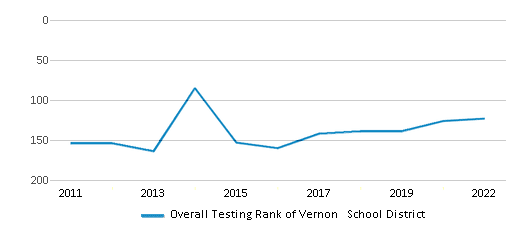
Math Test Scores (% Proficient)
41%
40%
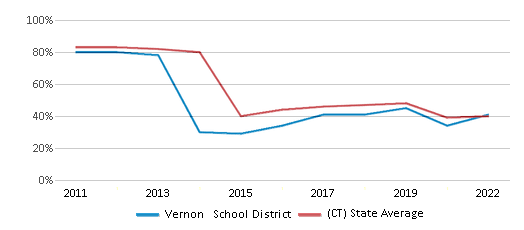
Reading/Language Arts Test Scores (% Proficient)
51%
50%
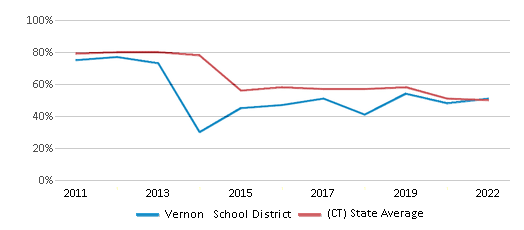
Science Test Scores (% Proficient)
51%
47%
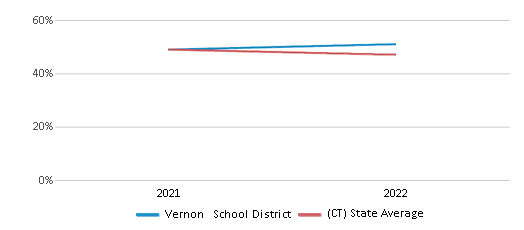
Graduation Rate
82%
89%
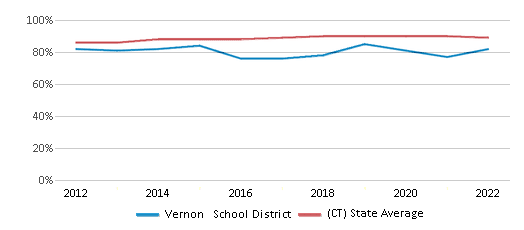
Students by Ethnicity:
Diversity Score
0.68
0.70
# American Indian Students
1 Student
393 Students
% American Indian Students
n/a
n/a
# Asian Students
229 Students
6,950 Students
% Asian Students
7%
5%
# Hispanic Students
749 Students
51,739 Students
% Hispanic Students
24%
35%
# Black Students
319 Students
25,158 Students
% Black Students
10%
17%
# White Students
1,595 Students
58,972 Students
% White Students
50%
39%
# Hawaiian Students
1 Student
133 Students
% Hawaiian Students
n/a
n/a
# Two or more races Students
278 Students
6,621 Students
% of Two or more races Students
9%
4%
Students by Grade:
# Students in PK Grade:
153
3,126
# Students in K Grade:
247
5,110
# Students in 1st Grade:
226
5,267
# Students in 2nd Grade:
242
5,285
# Students in 3rd Grade:
198
5,058
# Students in 4th Grade:
237
5,467
# Students in 5th Grade:
213
8,206
# Students in 6th Grade:
229
30,017
# Students in 7th Grade:
210
36,979
# Students in 8th Grade:
245
37,304
# Students in 9th Grade:
223
2,229
# Students in 10th Grade:
245
2,157
# Students in 11th Grade:
259
1,979
# Students in 12th Grade:
248
1,871
# Ungraded Students:
-
-
District Revenue and Spending
The revenue/student of $23,508 in this school district is less than the state median of $26,157. The school district revenue/student has declined by 5% over four school years.
The school district's spending/student of $22,816 is less than the state median of $25,225. The school district spending/student has declined by 5% over four school years.
Total Revenue
$75 MM
$12,920 MM
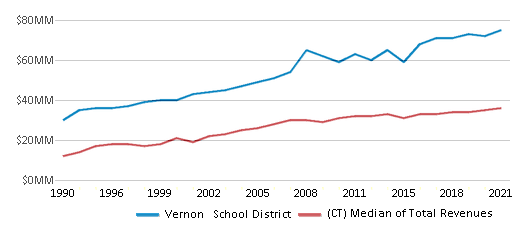
Spending
$72 MM
$12,459 MM
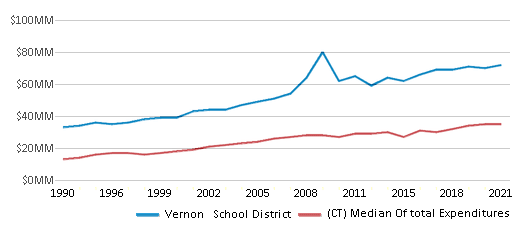
Revenue / Student
$23,508
$26,157
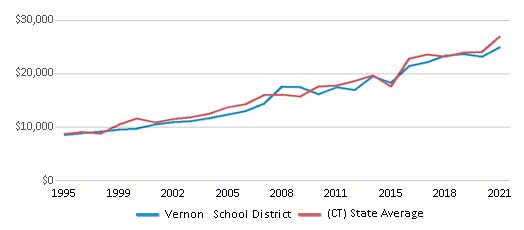
Spending / Student
$22,816
$25,225
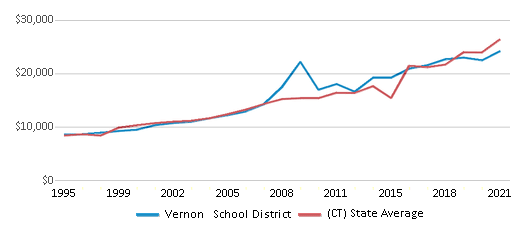
Best Vernon School District Public Middle Schools (2025)
School
(Math and Reading Proficiency)
(Math and Reading Proficiency)
Location
Grades
Students
Rank: #11.
Vernon Center Middle School
(Math: 39% | Reading: 49%)
Rank:
Rank:
5/
Bottom 50%10
777 Hartford Tpke.
Vernon Rockville, CT 06066
(860) 870-6070
Vernon Rockville, CT 06066
(860) 870-6070
Grades: 6-8
| 684 students
Recent Articles

Year-Round Or Traditional Schedule?
Which is more appropriate for your child? A year-round attendance schedule or traditional schedule? We look at the pros and cons.

Why You Should Encourage Your Child to Join a Sports Team
Participating in team sports has a great many benefits for children, there is no doubt. In this article you will learn what those benefits are.

White Students are Now the Minority in U.S. Public Schools
Increasing birth rates among immigrant families from Asia and Central and South America, combined with lower birth rates among white families, means that for the first time in history, public school students in the United States are majority-minority. This shift in demographics poses difficulties for schools as they work to accommodate children of varying language abilities and socio-economic backgrounds.





